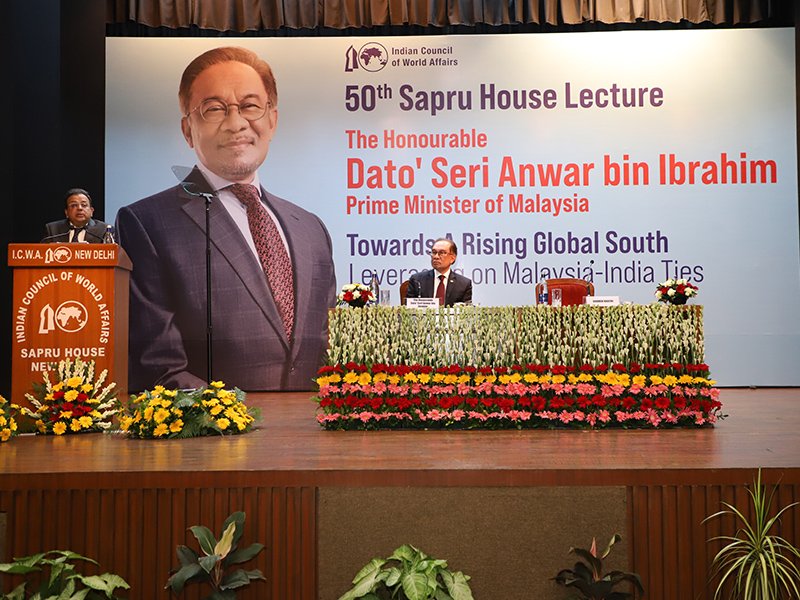
“It is an honour and privilege to speak to you today, here in a land of blessing and peace, described by poets, philosophers, and sages with nothing less than the most richly textured of words.” With these words, The Honourable Dato’ Seri Anwar bin Ibrahim, Prime Minister of Malaysia, opened the 50th Sapru House Lecture in New Delhi. The lecture, titled “Towards a Rising Global South: Leveraging on Malaysia-India Ties,” was a significant moment in the ongoing dialogue between Malaysia and India, highlighting the enduring bond between the two nations and their shared aspirations for the Global South.
The Legacy of Friendship: Nehru and Rahman
Reflecting on the deep historical ties between Malaysia and India, Prime Minister Anwar recalled the friendship between Pandit Jawaharlal Nehru and Malaysia’s first Prime Minister, Tunku Abdul Rahman. “Their camaraderie built on trust and shared values formed the foundation of almost seven decades of our bilateral ties, ties that have remained strong and unmoved.” This friendship, he emphasized, is not merely a relic of the past but a guiding light for the future, especially in an era marked by uncertainty.
A Rising Global South: The New Voice of Power
Prime Minister Anwar’s lecture centred on the theme of the Global South, which he described as “the reclaiming of a voice that can no longer be ignored in the emerging international order.” With the Global South now accounting for 40% of world GDP and 85% of the world’s population, the region’s importance on the global stage is undeniable. “By 2030, three of the four largest economies will be from the Global South – one of them, of course, being India.”
He emphasised the potential of the Global South to shape the international agenda, particularly in addressing pressing issues such as climate change, supply chain resilience, food security, and Artificial Intelligence governance. “An empowered Global South, as I see it, is inevitable,” he declared, urging collaboration among Southern nations to pursue a collective good with level playing fields for all.
Malaysia and India: A Comprehensive Strategic Partnership
Prime Minister Anwar announced that Malaysia and India have agreed to elevate their ties to a Comprehensive Strategic Partnership. This new level of cooperation will focus on shared priorities such as connectivity, sustainable economic growth, green development, technological transformation, and the delivery of public goods. “While we have made significant strides in our bilateral cooperation, there is still much room for further strengthening,” he noted.
Transforming Trade Dynamics
Trade between Malaysia and India, which now stands at US$16.5 billion, has been a cornerstone of their bilateral relationship. Prime Minister Anwar highlighted the evolution of trade composition between the two nations, reflecting broader economic transformations. “Two decades ago, palm oil and petroleum products dominated Malaysia’s exports to India… Today, these primary commodities account for just one-third of exports, with electrical and electronics products becoming key export items.”
This shift underscores Malaysia’s transition towards higher-value-added industries and India’s growing industrial capacity. “Clearly, both Malaysia and India have come a long way in our economic partnership,” he said, expressing optimism about the road ahead and the vast opportunities for further economic collaboration.
Strategic Connectivity and the Global South Agenda
Prime Minister Anwar spoke at length about the strategic importance of Malaysia-India ties in the context of the Global South. He pointed to the potential for deeper integration in the semiconductor industry and the importance of air connectivity between the two nations. “Stronger Malaysia-India ties are consequential to a better-connected Global South,” he asserted, emphasizing Malaysia’s strategic position as one of the best-connected Southeast Asian countries to India by air.
He also highlighted the joint membership of Malaysia and India in the Indian Ocean Rim Association (IORA) as an opportunity to push for change and development in the region. “I must commend India for leading the drafting of the IORA’s Outlook on the Indo-Pacific,” he said, expressing confidence that this document will help contextualize and put the region’s efforts in perspective.
Inclusivism, Ethics, and Humanity: A Call for Unity
In the closing section of his lecture, Prime Minister Anwar spoke passionately about the need for inclusivism, ethics, and humanity in addressing the challenges of our time. He rejected the notion that multiculturalism and shared prosperity are mere constructs of convenience, emphasizing instead the importance of cooperation and mutual support among nations. “We believe that no man is an island and no one people can prosper, truly, without the help and cooperation of others.”
Citing Mahatma Gandhi, he called for a rejection of hatred and extremism in all its forms. “Looming over us is the menacing threat of extremism… We must stand against interreligious violence,” he urged, stressing the shared values of truth, ethics, and humanity that unite people across religious and cultural divides.
Facing the Future with Courage
Prime Minister Anwar concluded his lecture with a call to courage and resilience in the face of the formidable challenges ahead. Quoting Rabindranath Tagore, he urged his audience to embrace not the comforts of safety, but the unyielding courage to confront adversity head-on: “Let me not pray to be sheltered from dangers, but to be fearless in facing them.”
In his final words, he reminded the audience of the profound responsibility they share as architects of thought and nation-builders, urging them to forge a future together, illuminated by the brilliance of their shared endeavours and unwavering commitment to the ideals that define them.
Leave a Reply